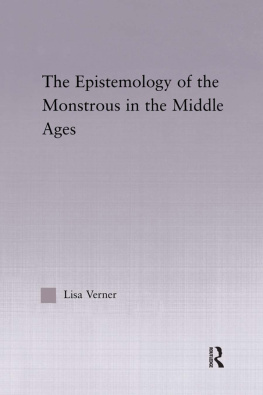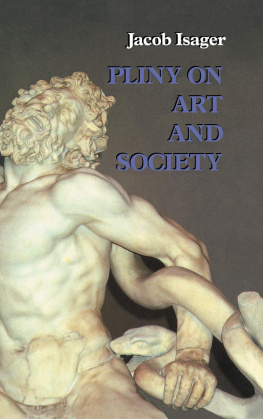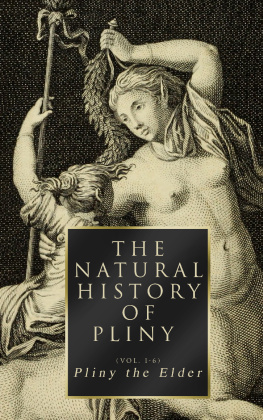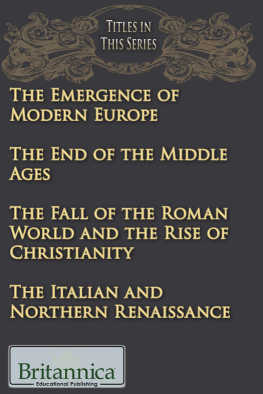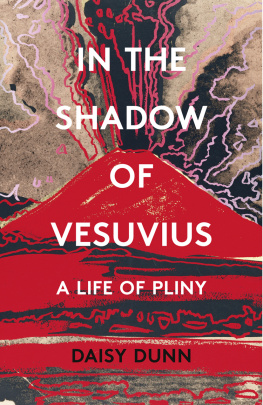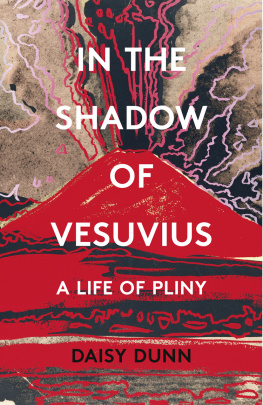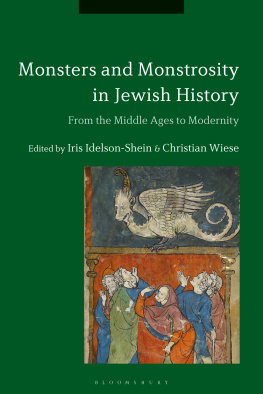Lisa Verner - The Epistemology of the Monstrous in the Middle Ages
Here you can read online Lisa Verner - The Epistemology of the Monstrous in the Middle Ages full text of the book (entire story) in english for free. Download pdf and epub, get meaning, cover and reviews about this ebook. year: 2005, publisher: Routledge, genre: Religion. Description of the work, (preface) as well as reviews are available. Best literature library LitArk.com created for fans of good reading and offers a wide selection of genres:
Romance novel
Science fiction
Adventure
Detective
Science
History
Home and family
Prose
Art
Politics
Computer
Non-fiction
Religion
Business
Children
Humor
Choose a favorite category and find really read worthwhile books. Enjoy immersion in the world of imagination, feel the emotions of the characters or learn something new for yourself, make an fascinating discovery.
- Book:The Epistemology of the Monstrous in the Middle Ages
- Author:
- Publisher:Routledge
- Genre:
- Year:2005
- Rating:4 / 5
- Favourites:Add to favourites
- Your mark:
- 80
- 1
- 2
- 3
- 4
- 5
The Epistemology of the Monstrous in the Middle Ages: summary, description and annotation
We offer to read an annotation, description, summary or preface (depends on what the author of the book "The Epistemology of the Monstrous in the Middle Ages" wrote himself). If you haven't found the necessary information about the book — write in the comments, we will try to find it.
This book studies the phenomena of monsters and marvels from the time of Pliny the Elder through the 14th century.
Lisa Verner: author's other books
Who wrote The Epistemology of the Monstrous in the Middle Ages? Find out the surname, the name of the author of the book and a list of all author's works by series.
The Epistemology of the Monstrous in the Middle Ages — read online for free the complete book (whole text) full work
Below is the text of the book, divided by pages. System saving the place of the last page read, allows you to conveniently read the book "The Epistemology of the Monstrous in the Middle Ages" online for free, without having to search again every time where you left off. Put a bookmark, and you can go to the page where you finished reading at any time.
Font size:
Interval:
Bookmark:
MEDIEVAL HISTORY AND CULTURE
Edited by
Francis G. Gentry
Pennsylvania State University
A ROUTLEDGE SERIES
MEDIEVAL HISTORY
FRANCIS G. GENTRY, General Editor
THE LITERAL SENSE AND THE GOSPEL OF JOHN IN LATE MEDIEVAL COMMENTARY AND LITERATURE
Mark Hazard
THE REPRODUCTIVE UNCONSCIOUS IN LATE MEDIEVAL AND EARLY MODERN ENGLAND
Jennifer Wynne Hellwarth
MYSTICAL LANGUAGE OF SENSE IN THE LATER MIDDLE AGES
Gordon Rudy
FAIR AND VARIES FORMS
Visual Textuality in Medieval Illustrated Manuscripts
Mary C. Olson
QUEENS IN THE CULT OF THE FRENCH RENAISSANCE MONARCHY
Public Law, Royal Ceremonial, and Political Discourse in the History of Regency Government, 14841610
Elizabeth A. Mccartney
THE CONTESTED THEOLOGICAL AUTHORITY OF THOMAS AQUINAS
The Controversies between Hervaeus Natalis and Durandis of St. Pourain
Elizabeth Lowe
BODY AND SACRED PLACE IN MEDIEVAL EUROPE, 11001389
Dawn Marie Hayes
WOMEN OF THE HUMILIATI
A Lay Religious Order in Medieval Civic Life
Sally Mayall Brasher
CONSUMING PASSIONS
The Uses of Cannibalism in Late Medieval and Early Modern Europe
Merrall Llewelyn Price
LITERARY HYBRIDS
Crossdressing, Shapeshifting, and Indeterminacy in Medieval and Modern French Narrative Erika E. Hess
PESTILENCE IN MEDIEVAL AND EARLY MODERN ENGLISH LITERATURE
Bryon Lee Grigsby
RACE AND ETHNICITY IN ANGLO-SAXON LITERATURE
Stephen J. Harris
ASPECTS OF LOVE IN JOHN GOWERS CONFESSIO AMANTIS
Ellen Shaw Bakalian
THE KINGS TWO MAPS
Cartography and Culture in Thirteenth-Century England
Daniel Birkholz
THE MEDIEVAL TRADITION OF THEBES
History and Narrative in the OF Roman de Thbes, Boccaccio, Cahucer, and Lydgate Dominique Battles
WORLDS MADE FLESH
Reading Medieval Manuscript Culture
Lauryn S. Mayer
EMPOWERING COLLABORATIONS
Writing Partnerships between Religious Women and Scribes in the Middle Ages
Kimberly M. Benedict
THE EPISTEMOLOGY OF THE MONSTROUS IN THE MIDDLE AGES
Lisa Verner
THE EPISTEMOLOGY OF THE
MONSTROUS IN THE MIDDLE AGES
Lisa Verner

First published 2005 by Routledge
Published 2016 by Routledge
2 Park Square, Milton Park, Abingdon, Oxon OX14 4RN
711 Third Avenue, New York, NY 10017, USA
Routledge is an imprint of the Taylor & Francis Group.
Copyright 2005 Taylor & Francis.
All rights reserved. No part of this book may be reprinted or reproduced or utilised in any form or by any electronic, mechanical, or other means, now known or hereafter invented, including photocopying and recording, or in any information storage or retrieval system, without permission in writing from the publishers.
Notice:
Product or corporate names may be trademarks or registered trademarks, and are used only for identification and explanation without intent to infringe.
Credits and acknowledgments borrowed from other sources and reproduced, with permission, in this textbook appear on appropriate page within text.
ISBN: 9780415972437 (hbk)
Library of Congress Cataloging-in-Publication Data
Verner, Lisa, 1966
The epistemology of the monstrous in the Middle Ages / by Lisa Verner.
p. cm.(Studies in medieval history and culture ; v. 33)
ISBN 0415972434 (alk. paper)
1. English literatureMiddle English, 11001500History and criticism. 2. Monsters in literature. 3. English literatureOld English, ca. 4501100History and criticism. 4. Mandeville, John, Sir. Itinerarium. 5. BestiariesHistory and criticism. 6. Animals, Mythical, in literature. 7. MonstersHistoryTo 1500. 8. Travel, Medieval. I. Title. II. Series.
PR275.M625V47 2005
820.9370902dc22
2005018259
In memory of
Charles Wilson Verner
(19721989)
Excerpts from Pliny, Vol I, Loeb Classical Library Vol. 330, translated by H. Rackham, Cambridge, Mass., Harvard University Press (1938), reprinted by permission of the publishers and trustees of the Loeb Classical Library. The Loeb Classical Library is a registered trademark of the President and Fellows of Harvard College.
Excerpts from Pliny, Vol. II, Loeb Classical Library Vol. 352, translated by H. Rackham, Cambridge, Mass., Harvard University Press (1942), reprinted by permission of the publishers and trustees of the Loeb Classical Library. The Loeb Classical Library is a registered trademark of the President and Fellows of Harvard College.
Excerpts from Pliny, Vol. III, Loeb Classical Library Vol. 353, translated H. Rackham, Cambridge, Mass., Harvard University Press (1940), reprinted by permission of the publishers and trustees of the Loeb Classical Library. The Loeb Classical Library is a registered trademark of the President and Fellows of Harvard College.
Excerpts from Pliny, Vol. X, Loeb Classical Library Vol. 419, translated by D.E. Eicholz, Cambridge, Mass., Harvard University Press (1962), reprinted by permission of the publishers and trustees of the Loeb Classical Library. The Loeb Classical Library is a registered trademark of the President and Fellows of Harvard College.
Excerpts from St. Augustine, Vol. V, Loeb Classical Library Vol. 415, translated by Eva Matthews and William McAllen Green, Cambridge, Mass., Harvard University Press (1965), reprinted by permission of the publishers and trustees of the Loeb Classical Library. The Loeb Classical Library is a registered trademark of the President and Fellows of Harvard College.
Far from providing just a musty whiff of yesteryear, research in Medieval Studies enters the new century as fresh and vigorous as never before. Scholars representing all disciplines and generations are consistently producing works of research of the highest caliber, utilizing new approaches and methodologies. Volumes in the Medieval History and Culture series include studies on individual works and authors of Latin and vernacular literatures, historical personalities and events, theological and philosophical issues, and new critical approaches to medieval literature and culture.
Momentous changes have occurred in Medieval Studies in the past thirty years, in teaching as well as in scholarship. The Medieval History and Culture series enhances research in the field by providing an outlet for monographs by scholars in the early stages of their careers on all topics related to the broad scope of Medieval Studies, while at the same time pointing to and highlighting new directions that will shape and define scholarly discourse in the future.
Francis G. Gentry
I would like to thank those teachers and scholars who read and commented on every draft of my work and provided helpful direction and suggestions: Roy Liuzza, Michael Kuczynski, and Gerald Snare. I also owe a debt of gratitude to additional teachers and mentors who have influenced and assisted me over the years: Betty Candler, Charles Knight, Richard Rambuss, and Molly Travis. Colleagues at the University of New Orleans who have been particularly encouraging and supportive include Nancy Easterlin and Bonnie Noonan.
I am indebted to the staff at Tulane Universitys Howard Tilton Library, especially Patti Windham, Jennifer Cella, Annie Bullock, Thelma Osbey, Anquienetta Dickerson, and Graciela Alejos.
I am grateful to Andy Orchard for permission to quote from Pride and Prodigies: Studies in the Monsters of the Beowulf Manuscript, and to University of Aberdeen, Scodand, for permission to quote from
Font size:
Interval:
Bookmark:
Similar books «The Epistemology of the Monstrous in the Middle Ages»
Look at similar books to The Epistemology of the Monstrous in the Middle Ages. We have selected literature similar in name and meaning in the hope of providing readers with more options to find new, interesting, not yet read works.
Discussion, reviews of the book The Epistemology of the Monstrous in the Middle Ages and just readers' own opinions. Leave your comments, write what you think about the work, its meaning or the main characters. Specify what exactly you liked and what you didn't like, and why you think so.

